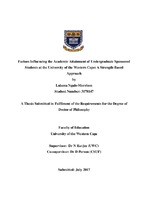Factors influencing the academic attainment of undergraduate sponsored students at the University of the Western Cape: a strength-based approach
Abstract
Deficit models dominate current research on academic retention and success in South African higher education and internationally. Most studies focus on students who are at risk of exiting higher education prematurely or those who fail academically because of their socio-economic conditions. Dropout and failure in existing research is often correlated to class and lack of access to financial resources. The prevailing philosophy based on needs assessment, deficit intervention and problem-solving does not sufficiently facilitate the academic success of diverse learners. Yet, surveys in most countries show that addressing weakness does not necessarily help people improve in their performance more than will highlighting their strengths (Hodges & Clifton, 2004). In contrast, this study adopts a strength-based approach, drawing largely on ‘ecological’ perspectives which recognize the importance of people’s surroundings and the multifaceted variables constantly at play, impacting the lives of students throughout the world. A strength-based model is posited as a pragmatic approach to pedagogy in the 21st century. This perspective recognizes the resilience of individuals and focuses on potential, strengths, interests, abilities, determination and capabilities rather than limits.
This study accepts that there are persistent challenges to widening participation in South African universities, and leakages in the education pipeline continue with little improvement in graduation rates. However, there are numerous undocumented examples of academically successful students from working-class backgrounds whose academic attainment is not accounted for. Empirical data is required to establish the relationship between academic success and the resilience of undergraduate sponsored students from working class backgrounds.
The case study examines factors that influence the academic attainment of undergraduate sponsored students and the institutional practices that enhance their performance at the University of the Western Cape. Factors motivating sponsored students from poor communities to succeed were explored. Furthermore, institutional influences that are relevant to, and inform students’ academic attainment are investigated. The study utilized a variety of data including relevant institutional documents, interviews with sponsored students and secondary data sourced from the Institutional Quality Assurance and Planning department.
Findings of the study show that affordability through funding for equitable access to higher education is a motivating factor in academic attainment for students from disadvantaged backgrounds. Also, participants in this study attributed their success to nurtured resilience across the institution, and the supportive relationships established through structured intervention programmes in and out of class. It is important to note, contrary to findings in other studies, that low socio economic background was more of a motivational factor and being resourceful for social mobility.
This study adds to the limited understanding of the academic attainment of students from poor backgrounds who succeed against all odds. This provides direction to universities for adopting different approaches and offers insights for the University of the Western Cape into the experiences of its graduates. Based on the findings, the study highlights recommendations and opportunities for future investigation.

